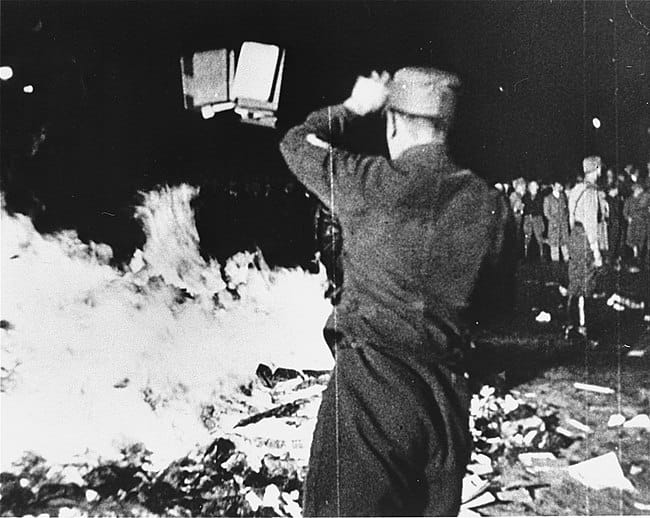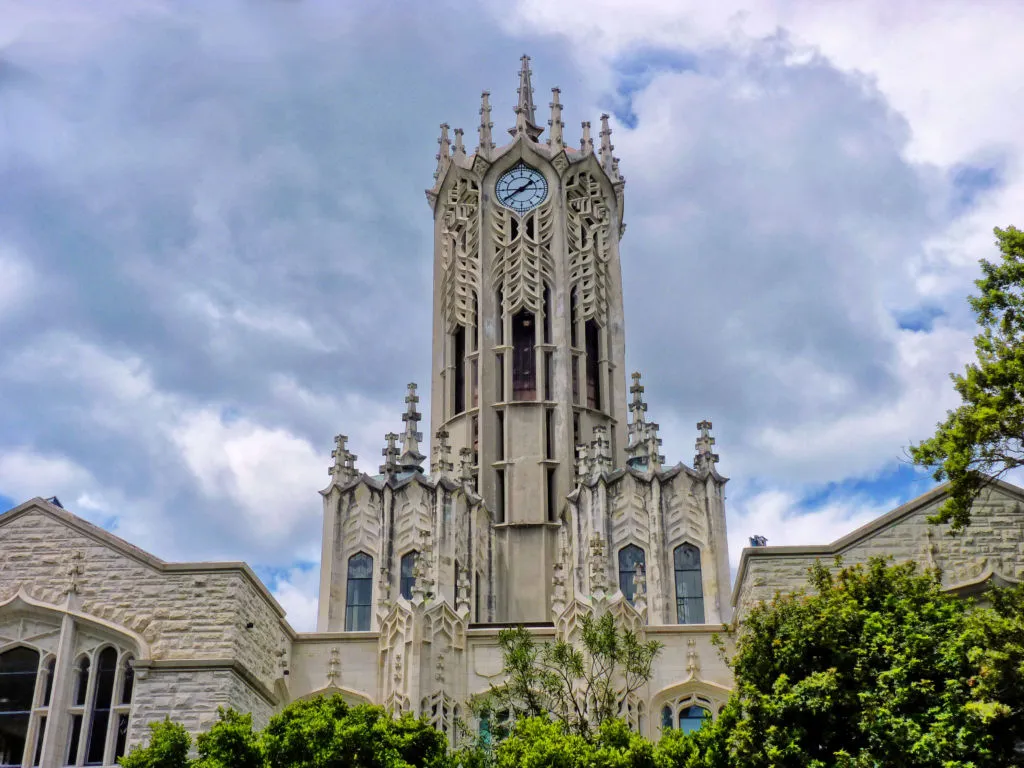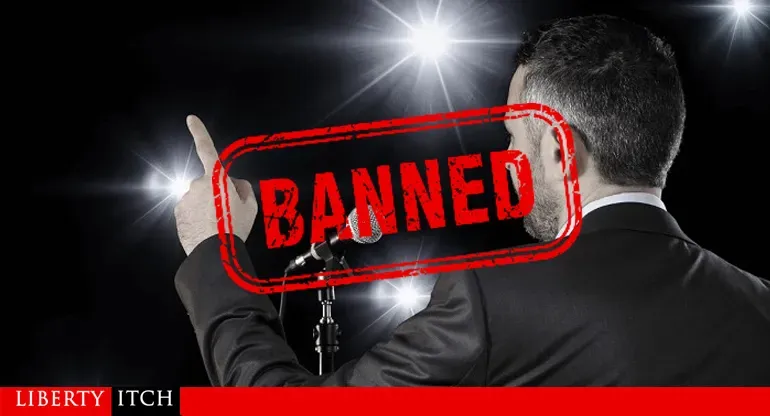Table of Contents
I was browsing in the Op shop a few days ago when I heard a comment on the radio that stopped me in my tracks. It was a news report that alleged white supremacist posters were being ripped down at Auckland University. My first reaction was to think to myself that the posters probably said something like “It’s OK to be White” as that is all it takes these days to trigger the snowflakes.
The next part of the story made my mouth drop open in astonishment. According to the person on the radio, the people putting up the offensive posters were exercising their freedom of speech but the people tearing down the posters were exercising their freedom of speech also.

I guess Hitler was just exercising his freedom of speech when he burned books? I had no idea that tearing down and destroying ideas that you disagree with was actually exercising your freedom of speech.

This lack of understanding of what free speech actually is from Auckland University students is shocking. If they want to exercise their freedom of speech they should be putting up posters with a counter argument or view, not tearing other people’s posters down!
I am not the only person to be shocked at what is happening at Auckland University. Chris Trotter has written an article with the catchy headline, An Open Letter From Closed Minds where he reflects on an open letter that was sent to the University about the “Racist” and “White supremacist” posters.
FEW SPECTACLES are more tragic than those in which a community destroys its core values in the misguided belief that it is upholding them. The 400+ academics who put their names to an open letter condemning racism and white supremacy on the Auckland campus undoubtedly did so with the best of intentions, but in signing the document they have either deliberately, or unwittingly, endorsed a document of profound illiberality. […]
The Open Letter begins by invoking the idea of the university as a community of scholars and students: a place “dedicated to the creation, preservation and sharing of knowledge”. This fine beginning is marred almost immediately by the jarring claim that the university is also a place where: “We build our collective understanding of the world and ourselves, while nurturing innovation and maintaining what is best in our society.”
I don’t know about you but whenever I read the word collective I immediately think of the Borg.
This transformation of knowledge: from the fruits of work undertaken by individual scholars; to a collectivist endeavour undertaken for the maintenance of “what is best in our society”; is as sinister as it is tendentious. By this definition, the university is a place where individual insights must be subordinated to those which, in the collective judgement of the individual’s peers, constitute “what is best”. […]
In case we were in any doubt, the Open Letter declares it to be the opinion of the 400+ signatories that “racism and white supremacy have no place at the University of Auckland”.
No place? Not even in the disciplines of Anthropology, History, Philosophy and Sociology? Is it truly the case that the ideas and behaviours constitutive of so many of the characters and cultures of the University of Auckland’s students (and staff) are unworthy of academic scrutiny? Is the ideology of white supremacy, potentially so dangerous when driven underground, not to be interrogated and analysed? Is the near ubiquity of racism in everyday human behaviour not something to be investigated and discussed?
Apparently not.
The Open Letter makes it clear that its authors have already investigated the website of those responsible for postering and stickering the Auckland campus – the casus belli of this little culture war – and, in their own words: “have no difficulty in identifying this group and such displays as white supremacist in nature”.
It is most unlikely that “Action Zealandia”, the proprietor of the website and publisher of the offending posters and stickers, would disagree. These “radical nationalists” (as they prefer to call themselves) make no attempt to disguise their belief that a reassertion of European male supremacy is “what is best” for New Zealand society.
Many New Zealanders would assume that such an obviously anachronistic political organisation would not present much of a threat to a university full of highly-educated men and women. Surely, a group of confused young men, nostalgic for the lost social and political verities of the nineteenth century, are more to be pitied than feared?
That was certainly the opinion of the University of Auckland’s Vice-Chancellor, Professor Stuart McCutcheon, who upheld the right of those putting up the posters and stickers to exercise their freedom of speech – not matter how distasteful that speech might be. A wiser community of students and scholars would have nodded their agreement and moved on. But, alas, throughout the twenty-first century academic world such expressions of tolerance (and intellectual maturity) are as rare as they are inflammatory. The position taken by the Vice-Chancellor was not to be allowed to stand unchallenged. Into the valley of censorship and suppression rode the four-hundred! […]
The signatories to that letter reveal themselves to be authoritarians at best and true fascists at worst.
According to the Open Letter, these colonialist throwbacks are guilty of taking the “absolutist” position that “freedom of speech extends to the right to speak in ways that are hateful.” Hateful to whom?
If we were unkind we would label the language that the 400 use as Wokespeak (a Kiwi version of Newspeak from George Orwell’s novel Nineteen Eighty-Four). Here is an example of Wokespeak from the letter.
We also understand that the language of rights is complex and nuanced, recognising that such displays create an environment that brings harm to segments of our community, fraying the cultural tapestry that provides our diverse campus community with vitality and energy.”
Trotter translates this example of Wokespeak as “Our students have become so fragile, psychologically and ideologically, that they fall to pieces when confronted by people who do not like them or the cultures they come from.”
In another extract from the letter, the writers were not afraid to fray some “cultural tapestry” themselves by using Wokespeak to call the free speech defending Vice-Chancellor a pale, stale, male.
We also note that by virtue of their race, gender, class, country of origin, religious affiliation, sexual or gender identity, many people empowered to judge conduct on university campuses are less likely to be the focus of hate speech, and may be slower to recognise its impact on its intended targets.”
In that extract, they also inferred that he was incapable of recognising the harm his defence of freedom of speech was causing to all the (psychologically and ideologically frail) students because of the colour of his skin and his male genitals.
[…]Followed to its logical conclusion this variety of “identity politics” accords more weight to the opinions of a 19-year-old undergraduate woman from a non-European cultural background, than it does to a male Professor of Philosophy who has been teaching, writing and publishing peer-reviewed articles and books for the best part of 40 years.
This surrendering of expertise to identity is not the worst of it, however: not when one considers this remarkable sentence:
“However, ‘speech’ has many forms, including gesture and nonviolent protest. If these posters constitute ‘free speech’, the same can be said of the actions of individuals who remove those that they encounter.”
Um, no, actually, it can’t. Action Zealandia, in displaying its posters and stickers, is asserting its right to have its ideas considered, debated, and, if unable to convince its interlocutors, rejected. Bluntly, it is declaring: “We are here – so come and contend with us openly on the battlefield of ideas.” The only honourable answer that “any university worthy of the name” can give to such a challenge is: “Bring it on!”
[…] The anonymous authors of the Open Letter may wax eloquent about an “environment that celebrates free and open enquiry, teaches the lessons of the past, and builds a better future for all”, but their interpretation of “what is best” for society looks suspiciously like the one provided by every other totalitarian ideology: “What is best is what we say is best.” It may be the Academic Left that is ripping down posters today, confident that it possesses the power to silence all those who refuse to toe its line. But, times change.
The Daily Blog









